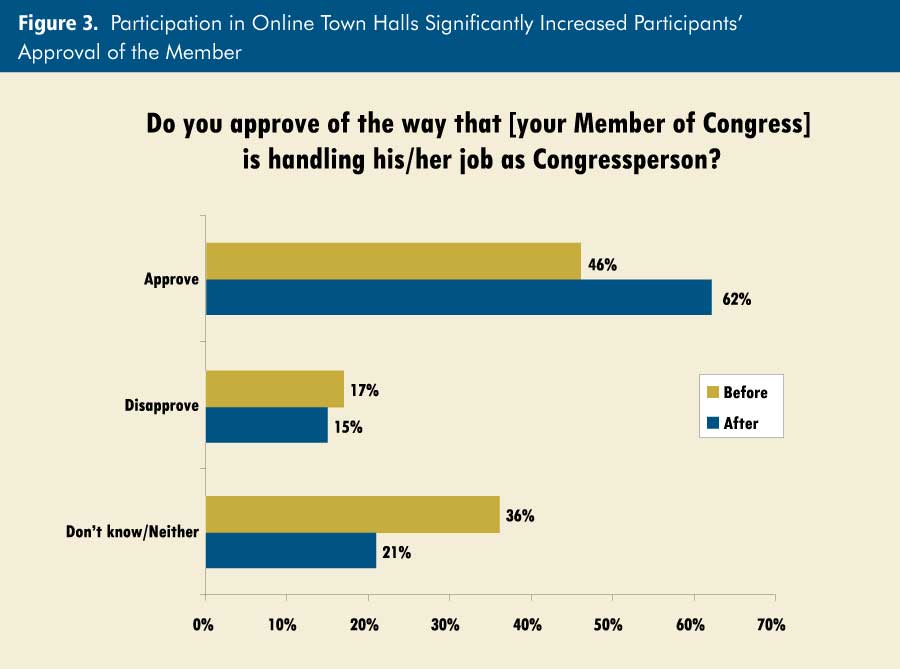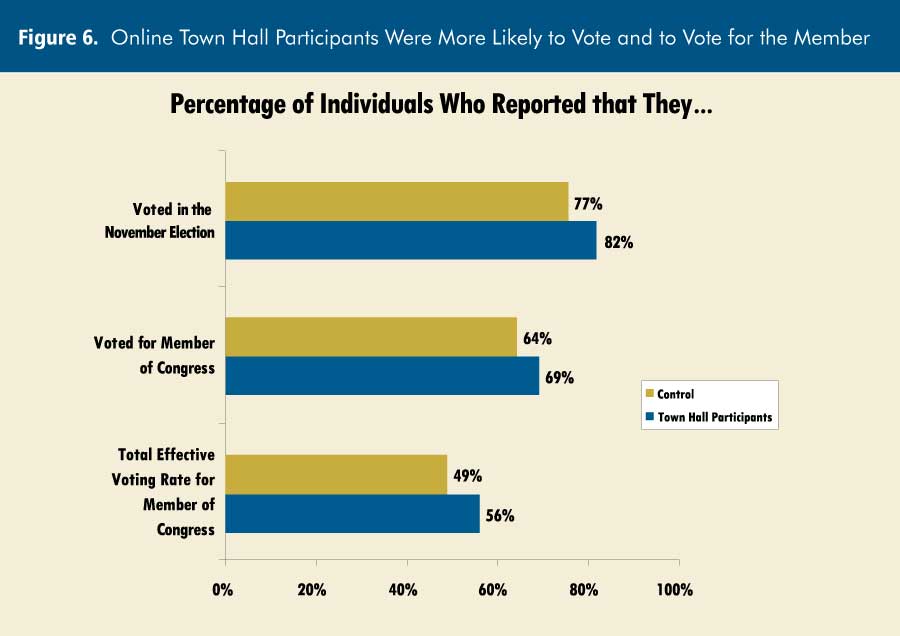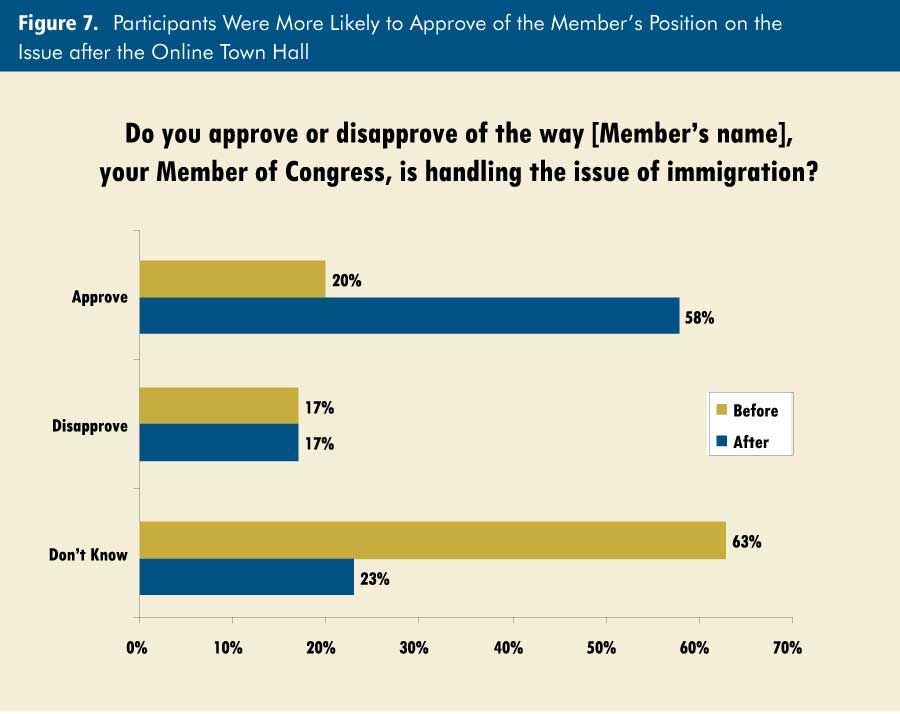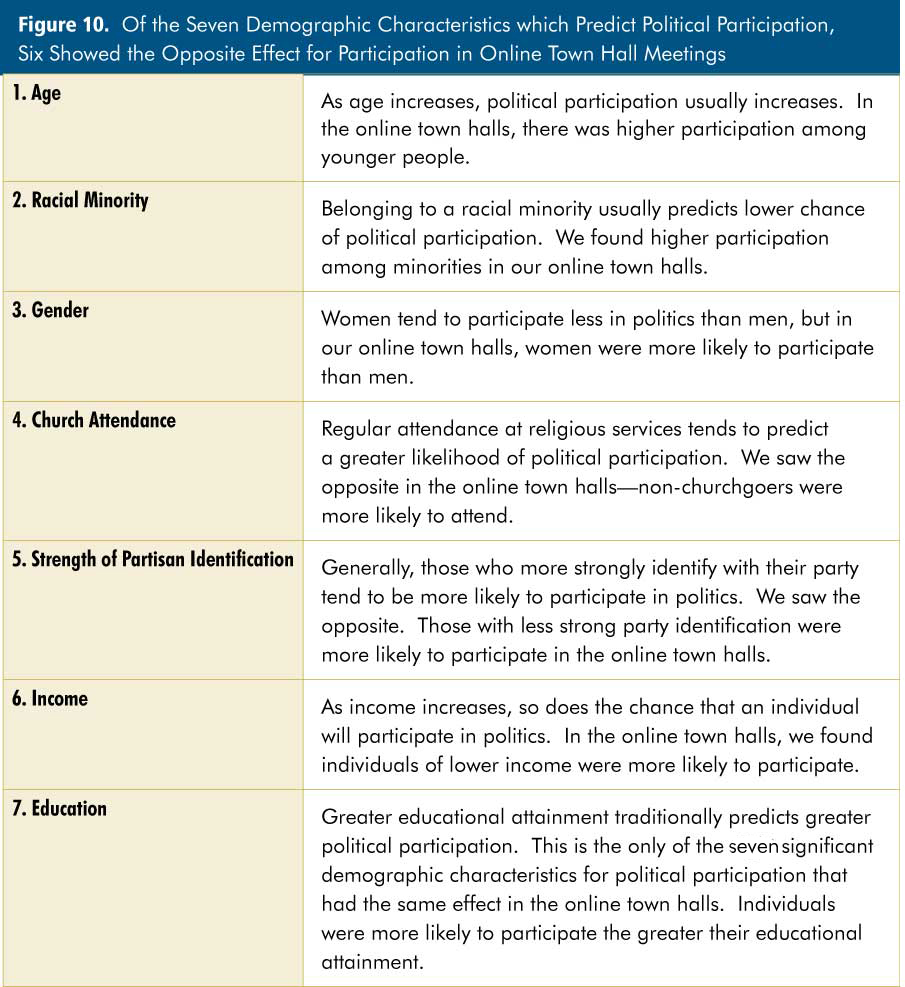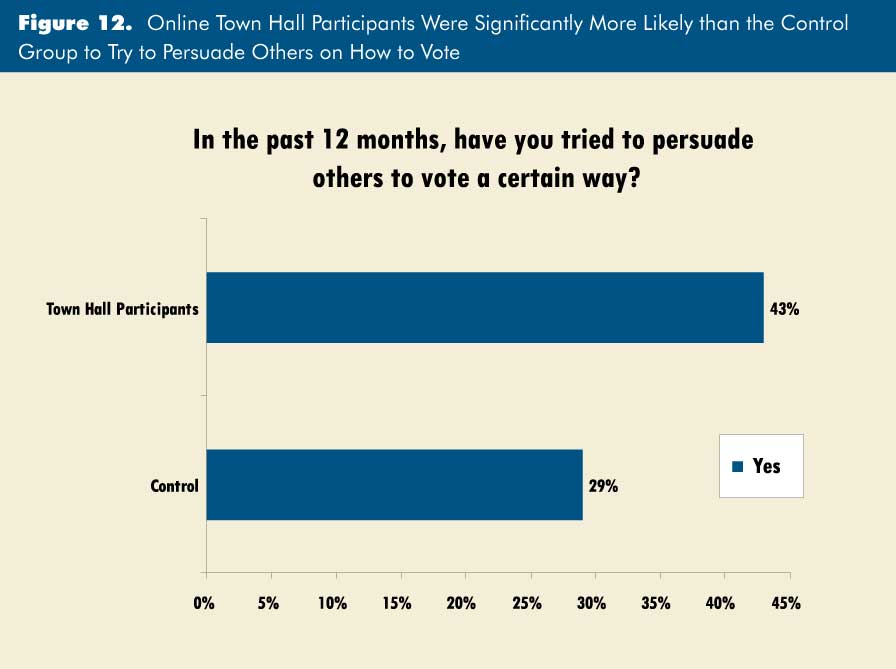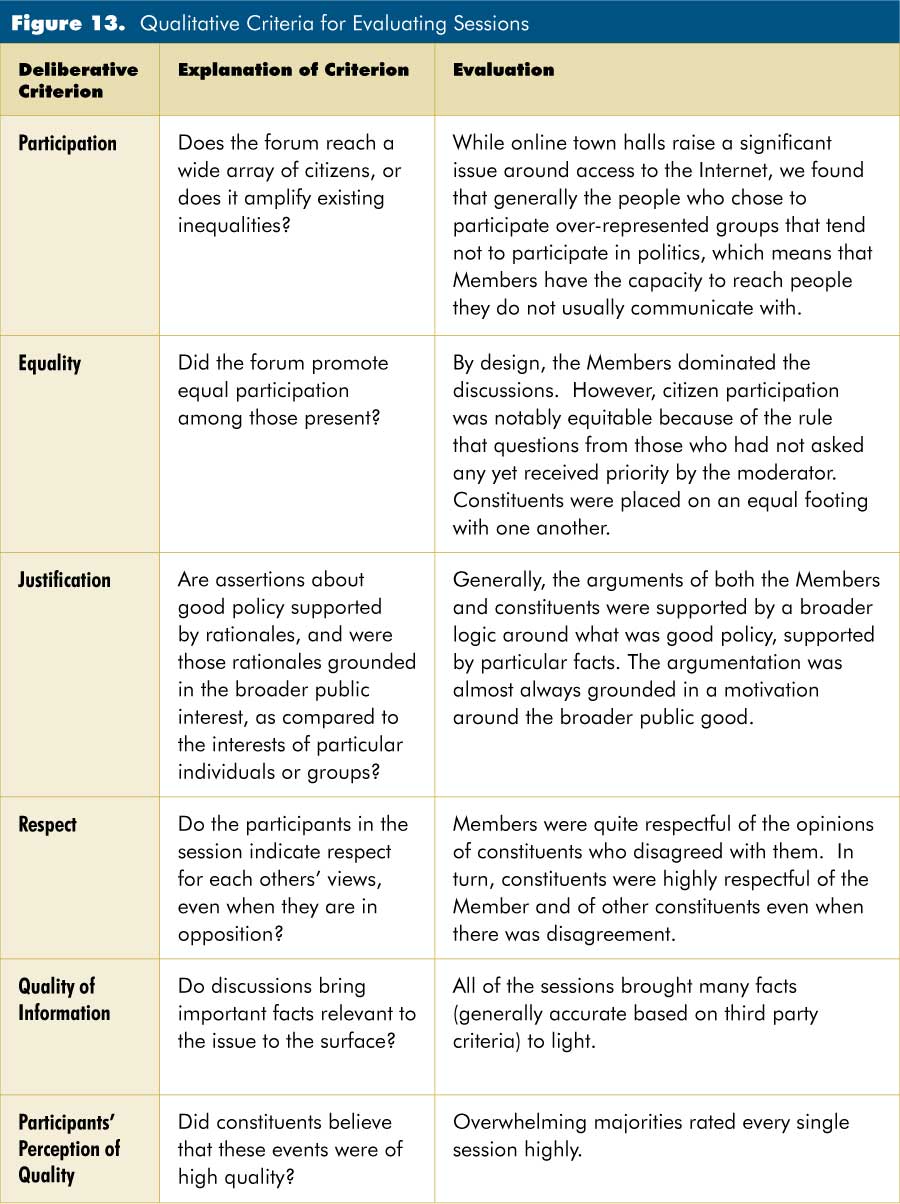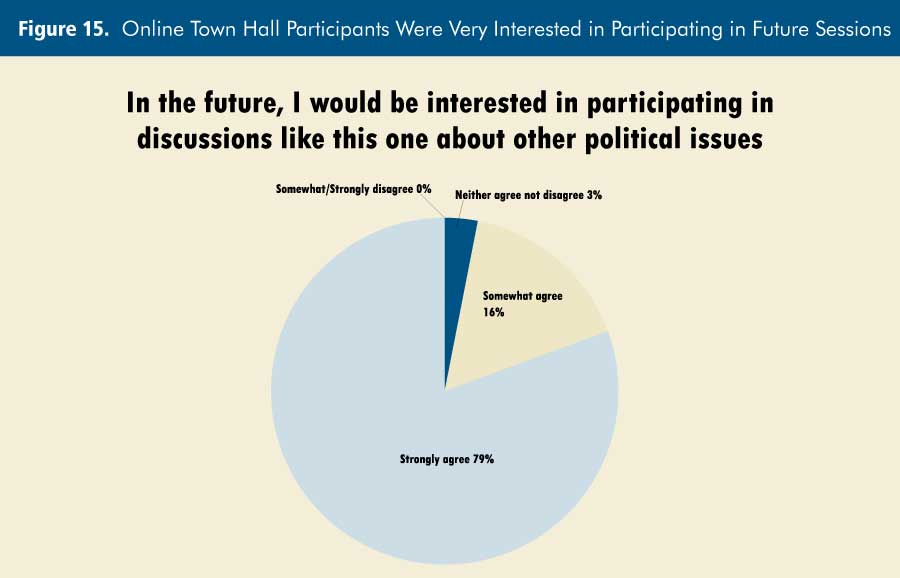Selected Charts
- Figure 3. Participation in Online Town Halls Significantly Increased Participants’ Approval of the Member
- Figure 6. Online Town Hall Participants Were More Likely to Vote and to Vote for the Member
- Figure 7. Participants Were More Likely to Approve of the Member’s Position on the Issue after the Online Town Hall
- Figure 10. Of the Seven Demographic Characteristics which Predict Political Participation, Six Showed the Opposite Effect for Participation in Online Town Hall Meetings
- Figure 12. Online Town Hall Participants Were Significantly More Likely than the Control Group to Try to Persuade Others on How to Vote
- Figure 13. Qualitative Criteria for Evaluating Sessions
- Figure 15. Online Town Hall Participants Were Very Interested in Participating in Future Sessions
- The positive results of the smaller sessions were also seen in the larger session
Click on any figure below to enlarge in new window.
Figure 3. Participation in Online Town Halls Significantly Increased Participants’ Approval of the Member
The sessions had a strikingly positive impact on constituents’ views of their Member of Congress. Every participant was asked before and after the session, “Do you approve of the way that [your Member of Congress] is handling his/her job?” The approval ratings of every Member who participated significantly improved as a result of the online sessions, largely because a significant number of individuals who responded “don’t know” to this question before the session responded “approve” after.4 On average the approval rating of the Member increased from a +29 (i.e., percentage approves minus percentage disapproves) to a +47. By comparison, there was no notable change in the approval ratings by the constituents in the control groups.
Figure 6. Online Town Hall Participants Were More Likely to Vote and to Vote for the Member
Perhaps most consequential for every participating Member was the increase in the percentage of participating constituents who actually turned out to vote and in the percentage that voted for their Member, as compared to those in the control group. On average, constituents who participated in the session were more likely to vote, and, if they voted, more likely to vote for the Member. Thus, the probability of a control subject voting for the Member was 49%, and of town hall participants, 56%. The impact of the event was particularly dramatic on swing voters, where an individual who we would have predicted in the control condition to be 50% likely to vote for the Member in the treatment condition5 was actually 73% likely to do so. This is all the more notable for the fact that most of these events occurred months before the election.
Figure 7. Participants Were More Likely to Approve of the Member’s Position on the Issue after the Online Town Hall
There was strong evidence of substantive persuasion on the issues toward the Member’s position, particularly amongst participants who were undecided, independent or did not know much about their Member. All of the sessions with Representatives focused on the issue of immigration. We found that approval of the Member’s position on immigration increased among participants in the online town halls. As one participant said, “I think that she was right on with most of her responses.” The majority did not know their Member’s position beforehand, but among those who heard their Member speak on it during the town halls, they overwhelming moved over to approving. Across Members, 20% of the participants reported approval of their Member’s position before the online session and 59% after. This would indicate that the participating Members of Congress were quite successful in their communications about the issue.
Figure 10. Of the Seven Demographic Characteristics which Predict Political Participation, Six Showed the Opposite Effect for Participation in Online Town Hall Meetings
Our findings strongly suggest that the sort of online town halls which we facilitated can actually reduce existing inequalities. Of the seven characteristics that traditionally predict participation in partisan and activist politics, six of them had the opposite effect for participation in the online town halls. Only level of education had the same effect. A multivariate analysis reveals that younger people, racial minorities, and lower income people were significantly more willing to participate in the town halls, all of which are reversals from traditional participation patterns. Similarly, women, less partisan people, and non-church goers – also demographics traditionally less represented in political participation – were slightly more likely to want to participate. Perhaps most interesting of all, constituents whose responses to the survey questions indicated they were generally frustrated and cynical about politics were especially eager to participate. By issuing a direct invitation to the session, rather than a district-wide broadcast, the Member communicates that he or she is specifically interested in what the constituent has to say, often affecting a rather dramatic change in attitude toward the Member. Thus, the online town halls appear to be an especially useful way to reach constituents who might be hard to reach via more traditional methods.
Figure 12. Online Town Hall Participants Were Significantly More Likely than the Control Group to Try to Persuade Others on How to Vote
To explore more deeply how the online town halls affected engagement with the political process, we asked citizens in our post-election survey whether they followed the election closely and whether they tried to persuade other citizens on how to vote. In both cases, constituents who participated in the session with their Member of Congress showed dramatic increases. For example, participation in the session increased the likelihood by 50% that constituents would try to persuade others to vote for the Member of Congress. Similarly, the fraction of individuals in the control group who did not follow the election was almost twice that of town hall participants.
Figure 13. Qualitative Criteria for Evaluating Sessions
We qualitatively evaluated the sessions from a variety of criteria developed in the political science literature on deliberation. These criteria are centered around participation (who was in the session, and who contributed to the discussion), content (the quality of the arguments by participants), and norms of discourse (e.g., did participants respect alternative points of view). We summarize these criteria on the next page and offer a summary of our evaluation of these sessions by each criterion. Across all dimensions, the online sessions were of strikingly high quality, which likely contributed to the substantial impact they had on participating constituents.
Figure 15. Online Town Hall Participants Were Very Interested in Participating in Future Sessions
Constituents almost uniformly described the experience as positive. As one participant stated, “I think this was a great learning experience for me.” Another said, “I believe we are experiencing the one way our elected representatives can here [sic] our voice and do what we want.” The numbers tell the same story: 95% Agreed (72% Strongly Agreed) that such sessions are “very valuable to our democracy” and 95% Agreed (79% Strongly Agreed) that they would be interested in doing similar online sessions for other issues. This level of agreement is rare on any survey, and is extraordinary in this climate of apathy – and sometimes of antipathy – toward government and Congress.
The positive results of the smaller sessions were also seen in the larger session
A key question raised by our initial sessions was whether the dramatically positive effects exist if the session is larger, or if the small size of the groups contributed to their success. It is a more efficient use of a Member’s time to run Internet-based events with 200 constituents than with 20. As noted above, we therefore ran a single event with a U.S. Senator on the issue of detainee policy in the summer of 2008. A direct comparison is difficult, since the event with the Senator focused on a different issue and used a very different type of constituent recruitment technique than the smaller sessions. However, all of our results were consistent with those reported above and generally comparable in magnitude. For example, the Senator’s net approval ratings jumped from a +16 to a +30, the margin voting in favor of the Senator (who was re-elected) in November went from +5 to +25 (an effect even larger than we observed in the smaller sessions), and there were comparable shifts in opinions toward the Senator’s position regarding waterboarding (from 48% opposing to 61%) and holding detainees indefinitely (from 45% opposing to 58%). Remarkably, only one participant (< 1%) indicated disinterest in participating in a similar session in the future. As a result, we are confident that Senators and Representatives can achieve high-quality deliberation with similarly positive impact on constituents even with larger groups.
Additional Information
Download the handouts from the briefing:  othm-briefing-handouts (1.1 MB)
othm-briefing-handouts (1.1 MB)
Download the entire report:  Online-Town-Hall-Meetings (1.0 MB)
Online-Town-Hall-Meetings (1.0 MB)
39 pages
Copyright 2009 by the Congressional Management Foundation
ISBN: 1-930473-12-5

